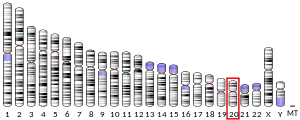KCNS1
Potassium voltage-gated channel subfamily S member 1 is a protein that in humans is encoded by the KCNS1 gene.[5][6] The protein encoded by this gene is a voltage-gated potassium channel subunit.[5][6]
| KCNS1 | |||||||||||||||||||||||||||||||||||||||||||||||||||
|---|---|---|---|---|---|---|---|---|---|---|---|---|---|---|---|---|---|---|---|---|---|---|---|---|---|---|---|---|---|---|---|---|---|---|---|---|---|---|---|---|---|---|---|---|---|---|---|---|---|---|---|
| Identifiers | |||||||||||||||||||||||||||||||||||||||||||||||||||
| Aliases | KCNS1, KV9.1, potassium voltage-gated channel modifier subfamily S member 1 | ||||||||||||||||||||||||||||||||||||||||||||||||||
| External IDs | OMIM: 602905 MGI: 1197019 HomoloGene: 20517 GeneCards: KCNS1 | ||||||||||||||||||||||||||||||||||||||||||||||||||
| |||||||||||||||||||||||||||||||||||||||||||||||||||
| |||||||||||||||||||||||||||||||||||||||||||||||||||
| |||||||||||||||||||||||||||||||||||||||||||||||||||
| |||||||||||||||||||||||||||||||||||||||||||||||||||
| |||||||||||||||||||||||||||||||||||||||||||||||||||
| Wikidata | |||||||||||||||||||||||||||||||||||||||||||||||||||
| |||||||||||||||||||||||||||||||||||||||||||||||||||
References
- GRCh38: Ensembl release 89: ENSG00000124134 - Ensembl, May 2017
- GRCm38: Ensembl release 89: ENSMUSG00000040164 - Ensembl, May 2017
- "Human PubMed Reference:". National Center for Biotechnology Information, U.S. National Library of Medicine.
- "Mouse PubMed Reference:". National Center for Biotechnology Information, U.S. National Library of Medicine.
- Salinas M, Duprat F, Heurteaux C, Hugnot JP, Lazdunski M (Oct 1997). "New modulatory alpha subunits for mammalian Shab K+ channels". J Biol Chem. 272 (39): 24371–9. doi:10.1074/jbc.272.39.24371. PMID 9305895.
- Gutman GA, Chandy KG, Grissmer S, Lazdunski M, McKinnon D, Pardo LA, Robertson GA, Rudy B, Sanguinetti MC, Stuhmer W, Wang X (Dec 2005). "International Union of Pharmacology. LIII. Nomenclature and molecular relationships of voltage-gated potassium channels". Pharmacol Rev. 57 (4): 473–508. doi:10.1124/pr.57.4.10. PMID 16382104. S2CID 219195192.
Further reading
- Strausberg RL, Feingold EA, Grouse LH, et al. (2002). "Generation and initial analysis of more than 15,000 full-length human and mouse cDNA sequences". Proc. Natl. Acad. Sci. U.S.A. 99 (26): 16899–903. Bibcode:2002PNAS...9916899M. doi:10.1073/pnas.242603899. PMC 139241. PMID 12477932.
- Shepard AR, Rae JL (1999). "Electrically silent potassium channel subunits from human lens epithelium". Am. J. Physiol. 277 (3 Pt 1): C412–24. doi:10.1152/ajpcell.1999.277.3.C412. PMID 10484328.
- Gerhard DS, Wagner L, Feingold EA, et al. (2004). "The status, quality, and expansion of the NIH full-length cDNA project: the Mammalian Gene Collection (MGC)". Genome Res. 14 (10B): 2121–7. doi:10.1101/gr.2596504. PMC 528928. PMID 15489334.
- Fossey SC, Mychaleckyj JC, Pendleton JK, et al. (2001). "A high-resolution 6.0-megabase transcript map of the type 2 diabetes susceptibility region on human chromosome 20". Genomics. 76 (1–3): 45–57. doi:10.1006/geno.2001.6584. PMID 11549316.
- Deloukas P, Matthews LH, Ashurst J, et al. (2001). "The DNA sequence and comparative analysis of human chromosome 20". Nature. 414 (6866): 865–71. Bibcode:2001Natur.414..865D. doi:10.1038/414865a. PMID 11780052.
External links
- Kv9.1+Potassium+Channel at the U.S. National Library of Medicine Medical Subject Headings (MeSH)
- KCNS1+protein,+human at the U.S. National Library of Medicine Medical Subject Headings (MeSH)
This article is issued from Wikipedia. The text is licensed under Creative Commons - Attribution - Sharealike. Additional terms may apply for the media files.



